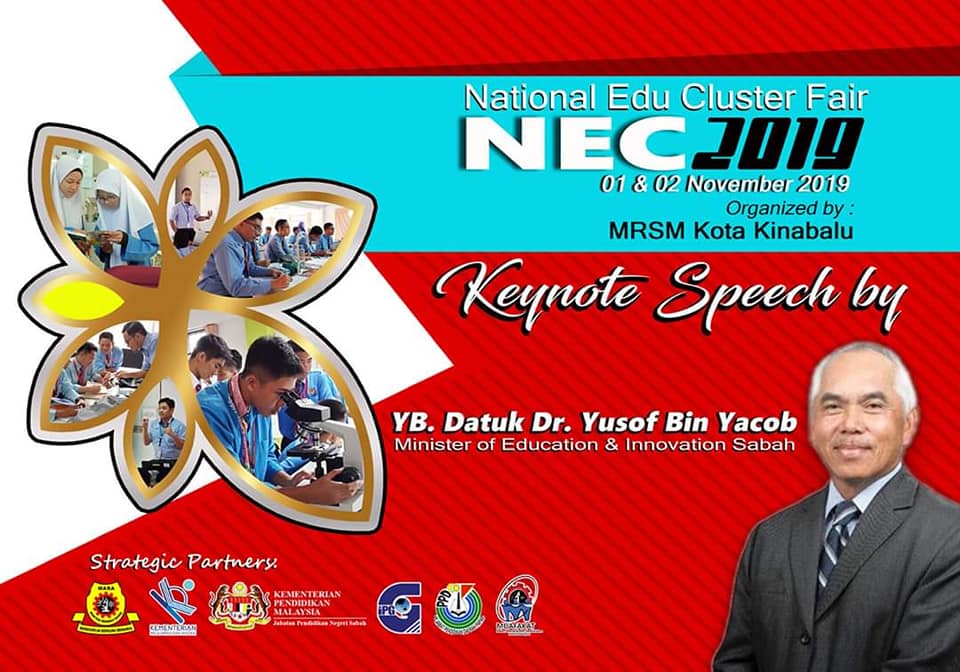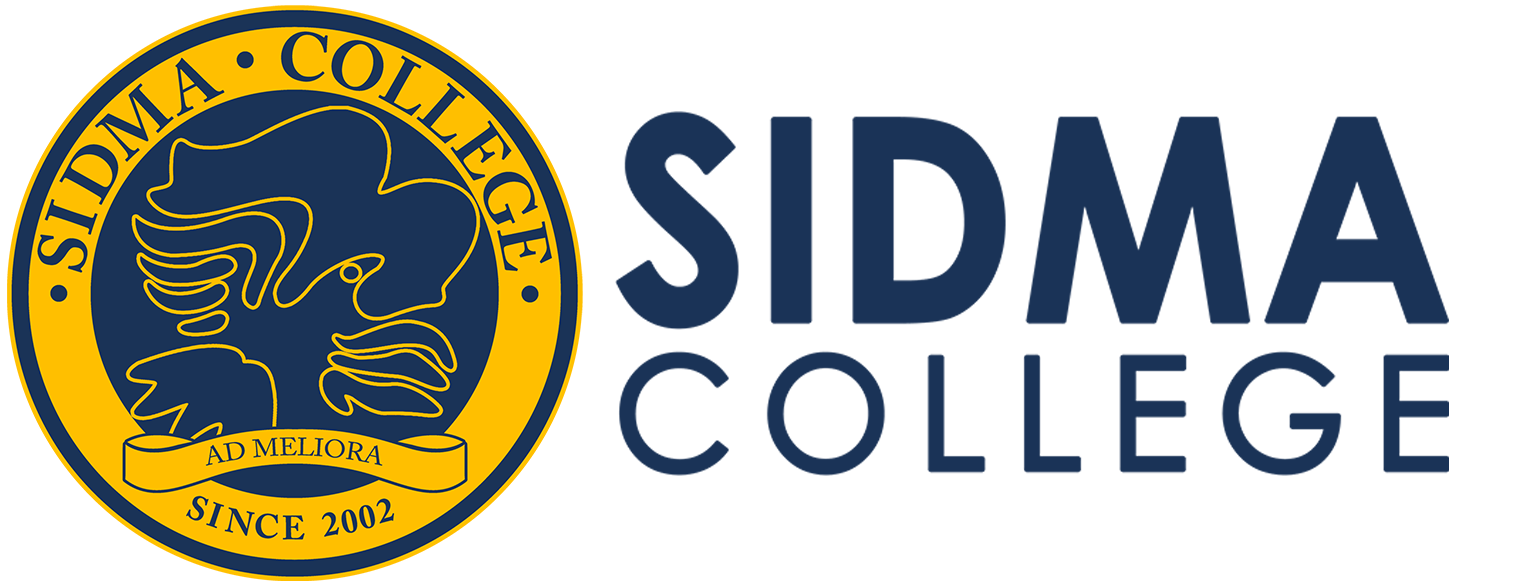 Prof Dr Morni Hj Kambrie, Chairman and Founder of SIDMA College Sabah led a team of SIDMA lecturers to participate in the National Education Cluster Fair Conference, on 1st and 2nd of November 2019, held at Maktab Rendah Sains Mara, Kota Kinabalu.
Prof Dr Morni Hj Kambrie, Chairman and Founder of SIDMA College Sabah led a team of SIDMA lecturers to participate in the National Education Cluster Fair Conference, on 1st and 2nd of November 2019, held at Maktab Rendah Sains Mara, Kota Kinabalu.
The event was officiated by Hon. Datuk Dr Yusof Yacob, Sabah Education and Innovation Minister. Earlier, in his keynote address to all Sabah educationalists, Datuk Dr Yusof reminded all state and national educationalists (including school teachers) to collaborate and cooperate with each other, and collectively play their role in educating and equipping students with relevant skills, knowledge, values and attitudes to ensure that they are able to cope with the Industrial Revolution 4.0 (IR4.0), which involves supplemented technology such as artificial intelligence (AI), augmented reality (AR), virtual reality (VR), big data and analytics, and even the Internet of Things.
He added that in order to ensure that current students are able to grasp the IR 4.0 requirement, all teachers need to expose their students with education-based IR4.0 concept across all subjects; by integrating Science, Technology, Engineering, Art and Mathematics (STEAM) as it is the basic pillar of the IR4.0 education system.
Thus, he added that all educators (including school teachers) need to be successful in educating and facilitating Process Decision Programme Chart (PDPC), a new management planning tool that systematically identifies what might go wrong, and counter measures needed to prevent or offset those problems. By using PDPC, teachers in classrooms can either revise the plan to avoid the problems or be ready with the best response when a problem occurs, thus enabling students to be skilled, creative and innovative workforce that can compete in this globalization era.
The key to developing these capabilities among educators is a lifelong learning environment that cuts across interdisciplinary, trans-disciplinary, cross-functional, cross-industry and cross-cultural. He added that in order to enable teachers to have the necessary skills and abilities to bring change and learning at all levels of society through open-mindedness, they need to embrace the latest thoughts and approaches along with science and technological developments. It is undeniable that the up skilling or reskilling of talents to keep pace with technological changes is becoming more critical than ever; and teachers need to play their role well.
On another note, Datuk Dr Yusof highlighted that based on the data from Ministry of Education’s Enrolment Statistics indicated that although about 32,000 students sat for the SPM, and another 8,000 sat for STPM each year in Sabah, but unfortunately about half of them did not proceed to pursue any kind of higher education. Many of these students have the potential and opportunities to further their education but are hampered by financial constraints or other social factors, and could not pursue their higher education.
Datuk Dr Yusof complemented Prof Dr Morni for establishing SIDMA College Sabah in Kota Kinabalu, which is nearer to the students’ hometown; and has helped students who could not secure a place in IPTA or those whose parents refused them to further their education outside Sabah, to continue their tertiary education at SIDMA College Sabah.
He too hope teachers, particularly those from the rural interior and smaller town of Sabah, through their respective Parent-Teacher Association will encourage parents to allow their children to continue their tertiary education. He added that the government provided various incentives for rural children to further their education through various scholarships, study loans (PTPTN loan) and more, and he hope that more students are able to continue their tertiary education at IPTA or IPTS; thus benefitting from the various facilities that the government has provided.
Earlier, Madam Gertrude Jock, Director, Institut Perguruan Gaya, Kota Kinabalu, in her keynote on the “Challenges and Opportunities of IR4.0 for educationist”; stated that IR4.0 is characterized by new advancement of technologies such as Al, VR, big data and analytics and Internet of Things. When adapted in the workplace it will enable new ways to execute work, bringing new opportunities for value creation to businesses and organizations - thus paving the way for the formation of digital ecosystems and collaborations as well as engagement with consumers at a greater scale.
During the N.E.C. Fair Conference, Madam Gertrude lead a team of more than 100 presenters from I.P. Gaya, Kota Kinabalu to share their innovations to all the participants of the forum through various parallel sessions held at MRSM.
Also present during the event were Sabah’s Majlis Amanah Rakyat (MARA) Director, Mr. Suhaimi Zainuddin and MRSM Principal Mr. Gilbert Wong Kia Kiat.
SIDMA College and University Tun Abdul Razak (UNIRAZAK) Sabah under the leadership of Prof Dr Morni Hj Kambrie (Chairman and Founder), and Madam Azizah Khalid Merican (CEO) prides itself in being the first private institution of higher (IPTS) in Sabah, offering various accredited courses ranging from Foundation Studies, Diploma Programs, Bachelor Degrees, and Masters Programs with very affordable rate to meet the needs of diverse students.
For the ongoing November 2019 Intake, the following courses are offered:
- Master of Business Administration
- Bachelor of Education (Hons)
- Bachelor of Early Childhood Education (Hons)
- Bachelor of Management (Hons)
- Diploma in Early Childhood Education.
- Diploma in Occupational Safety and Health.
Application can be done online through the following link @ http://bit.ly/UNIRAZAKSABAH or Whatsapp @ https://urdaftar1.wasap.my.
Interested parties are welcome to call SIDMA Hotlines: 088-732 000 or 088-732 020. Potential students are welcome to visit the campus located at Jalan Bundusan, 88300 Kota Kinabalu for more information and registration.
By Audrey Gee, Bryan Oliver Cabalce. Teo Eng Seng and Zain Azrai
SIDMA College UNIRAZAK Sabah,
KOTA KINABALU.



